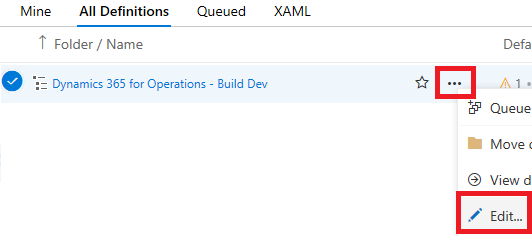Exclude test packages from build output
In Platform update 4, the automated build process lets you prevent specific packages from being included in the deployable package in the build output. This capability can be important for customers that use automated testing. These customers might want to build and run their tests, but prevent them from being added to the deployable package that the build generates as output.
When customers that have an existing build definition from Platform update 3 or earlier upgrade, they won't see the build definition automatically updated. To use the new feature, these customers must make a few manual edits to the build definition (see below for details).
The new feature exposes a new optional parameter for the package creation step in the build process. Because this parameter is managed by a build variable, you can easily adjust it.
In Microsoft Azure DevOps, on the Build & Release page, under Builds, on the All Definitions tab, find your build definition. Click the ellipsis (…), and then click Edit.

On the Variables tab, notice that the new build definition has a variable that is named PackagingExclusions.

In the PackagingExclusions variable, specify a comma-separated list of the names of packages that should not be packaged into the deployable package.
Note
The name of a package isn't necessarily the name of the model. Instead, the package name is typically the name of the folder where the model resides. Alternatively, you can copy and paste the package name from the descriptor file of one of the package's models. (In the XML, you can find the package name in the ModelModule field.)
For example, you have one package that is named MyCompanysAwesomeTests and another package that is named ContosoTaskRecordingTests, and you want to exclude both these packages from the deployable package. In this case, the value for the PackagingExclusions variable will look like this.

After you complete this setup, the build process will still build the code and run any tests that the packages contain. However, the deployable package that the build creates won't include those packages.
Update an existing build definition after upgrade to Platform update 4 or later
To use the new feature, you must manually update any existing build definitions that you deployed before Platform update 4.
Note
The feature can be added to a build definition only after you update the build virtual machine (VM) to Platform update 4 or later.
On the Variables tab, click + Add at the bottom of the page.
In the Name column, enter PackagingExclusions. In the last column, select the Settable at queue time check box.
On the Tasks tab, find the Generate Packages task. Click to select it.
On the right side of the page, find the Arguments parameter. Click in the text box, and then press the End key or scroll to the end of the text box. The new build definition will have a new argument that passes the PackagingExclusions variable that you defined earlier. However, for an existing build definition, add a space and then the following text to the end of the parameter: -ExclusionList "$(PackagingExclusions)"
The Arguments text box should now look like this.

Click Save.
You can now use the new feature as described.